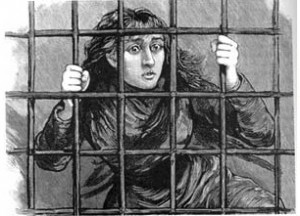 Dr. Amy Glaser, one of Park Slope’s most popular pediatricians, will be writing a regular column for OTBKB. Recently she opened Only Adolescents, a part-time practice for patients ages 13-22. In her new column The Doctor is In, Glaser will address a wide range of issues of interest to parents of children of all ages.
Dr. Amy Glaser, one of Park Slope’s most popular pediatricians, will be writing a regular column for OTBKB. Recently she opened Only Adolescents, a part-time practice for patients ages 13-22. In her new column The Doctor is In, Glaser will address a wide range of issues of interest to parents of children of all ages.
by Dr. Amy Glaser
When the Staten Island parents of a 6-year old girl wanted to show their daughter what happens to bad children who do not listen to their parents they took her to a police station and told the child they were going to leave her in the hands of the police.
Instead, to their amazement, they were handcuffed and arrested for child endangerment. The parents, who claimed that they were just trying to engage the police in their own ‘scared straight’ skit, insisted that they had no intention of actually leaving the child, and that it was all a big misunderstanding. The charges still stand.
This ridiculous chain of events brings to the surface the question of what is appropriate discipline, what is effective, and when parents have gone too far.
For parents of young children there are shelves of advice books suggesting time out, counting out loud and giving them time to collect themselves. Then there’s good old Jewish guilt and the old fashioned slap on the hand.
When it comes to discipline, there is obviously no one answer. All situations vary, including the age of the child, the circumstance, the emotional makeup of the child and the parenting style.
During the toddler years diversion is a helpful technique. In other words: catching the offender before the crime. An open box of fragile objects should be removed, an open pen substituted with a wooden spoon, When children bite I often suggest that parents carry a pretzel or other hard food and offer it up to the teething child.
I also suggest to parents of toddlers that they use words other than no, so as to not dilute its value. We do not… will get the idea across whereas no should be saved for a quick and dangerous situation. Reacting to the first offence is also important. Letting something go unnoticed at first will make it more difficult to extinguish later. And consistency counts for a lot. Pavlov’s experiments show us that a behavior that is intermittently reinforced is the most difficult to change.
It is also important that the punishment fit the crime. A child acting out in the park will more quickly see the offense when forced to stop playing and go home.
While it is expected that 3-year olds will constantly push limits, when a school age child is frequently negative it is important to stand back and examine what might be troubling them. Are they being bullied elsewhere, are they tired, are they struggling in school? Children do not want to be bad and it’s important to find out what’s really going on. Scare tactics have not been shown to be effective in reinforcing good behavior.
Also important, parents must be more focused on noticing the good and rewarding it. Remembering to complement the small accomplishments during the day so that our children know we notice goes a long way. Children learn by modeling behavior and we are their first models. The primary aim of course is to create human beings who feel good about themselves as they enter the world with goals, open minds and hope.
